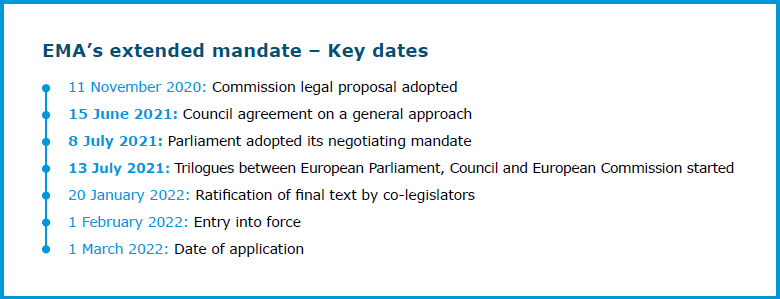
Strengthening EMA’s role in crisis preparedness and management of public health threats
The COVID-19 pandemic is an unprecedented ‘stress test’ of the resilience of European health systems. It has highlighted both strengths and limitations of the current EU health security framework, as well as the need for formalised preparedness and response tools.
The gaps in the public health preparedness and response exacerbated by the COVID-19 pandemic have been addressed in the European Commission’s proposal to build a ‘European Health Union’ capable of better addressing public health emergencies, which was launched on 11 November 2020. EMA is one of the EU agencies at the core of EU’s response to this global public health emergency.
The European Health Union package included a proposal for a Regulation reinforcing EMA’s mandate in order to facilitate a coordinated EU-level response to future crises.
Throughout 2021, EMA followed closely the progress of the package drafted by the Commission as it advanced through the EU’s legislative process in the Council of the European Union and the European Parliament.

How EMA prepared for the extended mandate
EMA set up an Extended Mandate Task Force (EMTF) to analyse the impact of the new legal mandate on the Agency’s organisational structure and activities, as well as to draft a roadmap for the implementation of the new rules in order to be ready for their coming into operation on 1 March 2022.
The Agency also put in place a communication plan to inform its stakeholders and provide the necessary guidance on how the new tasks will be implemented.
Main elements of EMA’s extended mandate
The extended mandate puts structures and processes established by EMA during the COVID-19 pandemic on a permanent footing, while entrusting several new tasks to the Agency.
EMA will be tasked with the monitoring of events, including medicine shortages, which might lead to a crisis situation, as well as with the reporting of shortages of critical medicines during a crisis. The Agency will also coordinate responses of EU countries on shortages of critical medical devices and in-vitro diagnostics occurring in crisis situations, after an initial transition period.
EMA will set up, maintain and manage, by early 2025, a European Shortages Monitoring Platform to facilitate data collection and reporting by companies and Member States on shortages, supply and demand of critical medicines. EMA has also been given the responsibility to coordinate twelve EU expert panels to provide advice to Member States and the European Commission on high-risk medical devices and in-vitro diagnostic medical devices.
Under its extended mandate, EMA will also facilitate a coordinated EU-level response to public health emergencies by:
- reinforcing the activities of the COVID-ETF in providing scientific advice and reviewing available scientific evidence on medicines with the potential to address a public health emergency, and supporting existing EMA committees with their authorisation and safety monitoring of medicines;
- coordinating independent vaccine effectiveness and safety monitoring studies using relevant data held by public authorities;
- investing in and leveraging real-world evidence to support crisis preparedness and response. This includes the establishment of a pan-European network of real-world data, DARWIN EU, which will provide EMA’s scientific committees with real-world evidence from healthcare databases across the EU.
HERA and EMA
The European Health Emergency preparedness and Response Authority (HERA) was established on 16 September. The role of HERA is to prevent, detect and rapidly respond to health emergencies. HERA will closely cooperate with EMA and ECDC and complement their work during and before emergencies in areas such as clinical trials, preparedness and response planning, and intelligence gathering. Emer Cooke, EMA’s Executive Director, was invited to become an observer on the HERA Board.